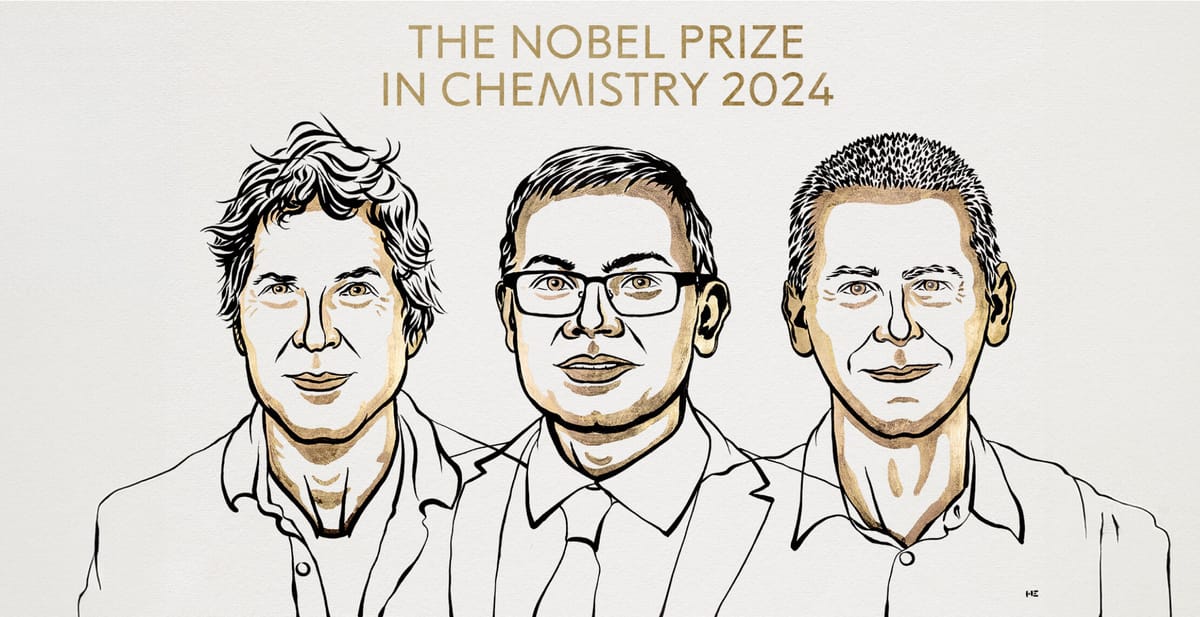
Google DeepMind's Demis Hassabis and John Jumper have been awarded the 2024 Nobel Prize in Chemistry, sharing half of the prize for their groundbreaking work in protein structure prediction using artificial intelligence. The other half has been awarded to David Baker of the University of Washington for his pioneering advances in computational protein design.
This announcement marks the second consecutive day of Nobel recognition for AI, following the Physics prize awarded yesterday to AI trailblazers Geoff Hinton and John Hopfield for their foundational work in machine learning.
Hassabis and Jumper received the award for their development of AlphaFold2, an AI model capable of predicting the 3D structure of proteins based on their amino acid sequences. This achievement has been celebrated as solving a 50-year-old challenge in biochemistry.
"With the help of AlphaFold2, they have been able to predict the structure of virtually all of the 200 million proteins that researchers have identified," stated the Nobel committee. The implications of this work are profound, potentially accelerating drug discovery, improving disease diagnosis, and advancing bioengineering efforts.
Baker's contribution lies in computational protein design—creating entirely new proteins that do not exist in nature. His work complements the capabilities of AlphaFold2 by moving beyond understanding existing proteins to creating novel possibilities, including pharmaceutical proteins, vaccines, and nanomaterials designed for specific tasks.
Heiner Linke, chair of the Nobel Committee for Chemistry, emphasized the significance of these discoveries: "The exuberant diversity of life’s chemistry is contained within proteins, and with AI, we’re now beginning to fully comprehend and harness their potential. This year’s discoveries fulfil a long-standing dream in chemistry, revolutionising our ability to predict and design proteins."
The AlphaFold2 model, which Google DeepMind made open-source, has already seen widespread adoption. Its impact on the scientific community has been transformative. Since its release, more than two million people from 190 countries have used AlphaFold2 for diverse applications, including understanding antibiotic resistance and designing enzymes capable of breaking down plastic waste.
By making AlphaFold2 freely accessible, DeepMind has catalyzed advancements across numerous disciplines, paving the way for faster drug discovery, novel bioengineering projects, and breakthroughs in tackling global health challenges. Tasks that once took years of painstaking lab work can now be completed within minutes.
Hassabis, DeepMind's CEO, is renowned for his multidisciplinary background, achieving chess master status as a teenager and later founding DeepMind, which was acquired by Google in 2014. Jumper, a senior research scientist at DeepMind, joined the company in 2017 and played an instrumental role in refining the AlphaFold model.
The Nobel Prize in Chemistry, accompanied by a cash award of approximately $1 million, will be split between the three laureates.
This year's Nobel Prize in Chemistry underscores the growing influence of AI in scientific research, following closely on the heels of the Physics award. It highlights how computational methods and AI are revolutionizing traditional scientific disciplines, opening new frontiers in our understanding of life's fundamental building blocks and pushing the boundaries of what is possible.

